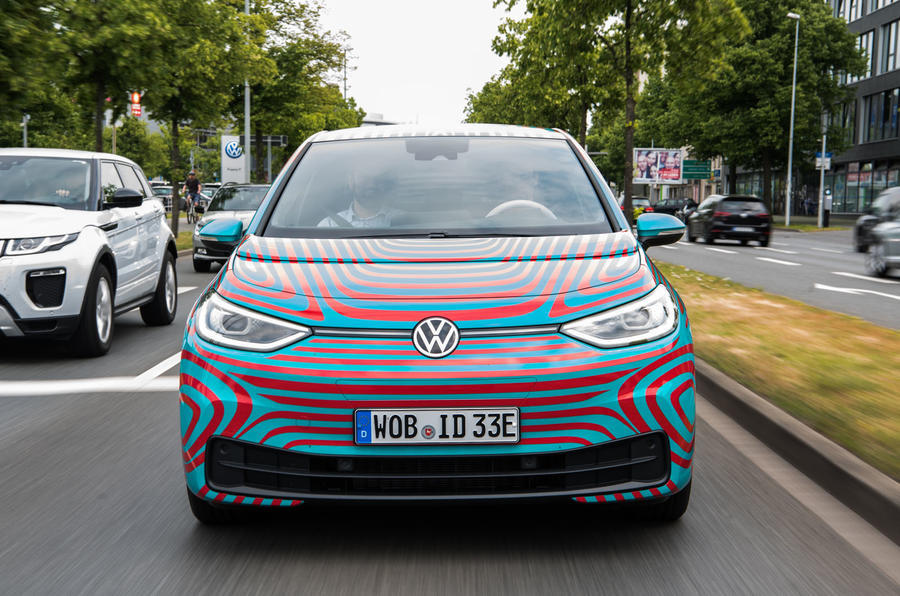It’s not hyperbole to say the Volkswagen ID 3 will be one of the most significant cars in the history of the company. The first fully electric car developed on Volkswagen’s all-electric MEB platform, it is the spearhead of a hugely ambitious electrification programme across the entire VW Group.
Volkswagen to reveal new logo at Frankfurt motor show
As with the Beetle and first-generation Golf, it represents the start of a new era for Volkswagen. In recognition of that, when the ID 3 is unveiled at the Frankfurt motor show next month, the firm will also undergo a wholesale brand revamp. That starts with a reworked logo, which retains the familiar circular VW design but with a simpler, two-dimensional design. Logo experts would probably describe it as ‘cleaner’, and it looks perfectly nice – particularly with the neat touch that it will appear in slightly different colours (electric cars get a white badge, combustion-engined machines a metal one, and GTI machines will get a red version).
But there’s more than just the new logo. There’s a new design scheme, new colours (light blue joining white and blue as official company colours), a new font, a new ‘sound logo’ and more. There’s even an official new voice: Hollywood star Scarlett Johansson… well, the actress who dubs her films in German, at least.
Say hello, then, to ‘New Volkswagen’.
Now, we know what you’re thinking: there’s a reason why the ‘Old Volkswagen’ brand needed a refresh: Dieselgate. Outlining the development of the brand revamp, Ralf Brandstätter, the firm’s chief operating officer, said the public revelations in late 2015 over how VW had cheated emissions tests were “a volcanic super-eruption that put the future of Volkswagen in doubt”.
The roots of new Volkswagen came in an off-site management meeting organised by new boss Herbert Diess in October of that year. As Diess explained to Autocar recently, that meeting directly led to VW scrapping a number of planned models, while sketching out the plan for the MEB chassis. It led to VW’s ‘Transform 2025+’ strategy, with a broad company restructuring built around focusing on popular models (read: more SUVs), and heavy investment in electric technology.
A key goal of ‘New Volkswagen’ is to offer “emission-free mobility for all”, with a commitment to achieve net zero CO2 – in both production and vehicle emissions – by 2050. That’s significant: given its size, Volkswagen estimates its manufacturing and products are responsible for around one per cent of total global CO2 production.









Join the debate
Add your comment
S T B OBVIOUS....?!
Maybe it isn’t that clear cut, but after the fiasco of the Co’2 scandal, trying to get back to where the were in trusted Car maker shouldn’t be that easy, ok, be contrite if they must to regain it, I hope the get there EV Cars right and it passes down through ,Audi, Seat too.
Pass
..the sick bag
Electric cars are interim technology
on the path to hydrogen fuel cells.
Hydrogen fuel cell cars are
Hydrogen fuel cell cars are still electric cars.
Perhaps you mean Battery Electric Cars are interim technology on the path to Hydrogen Fuel Cell Electric Cars?
I don’t agree, I think our electric transportation will be a combination of the two, with energy storage, be it batteries, hydrogen or something else, tailored to the needs of that vehicle.